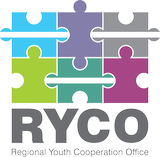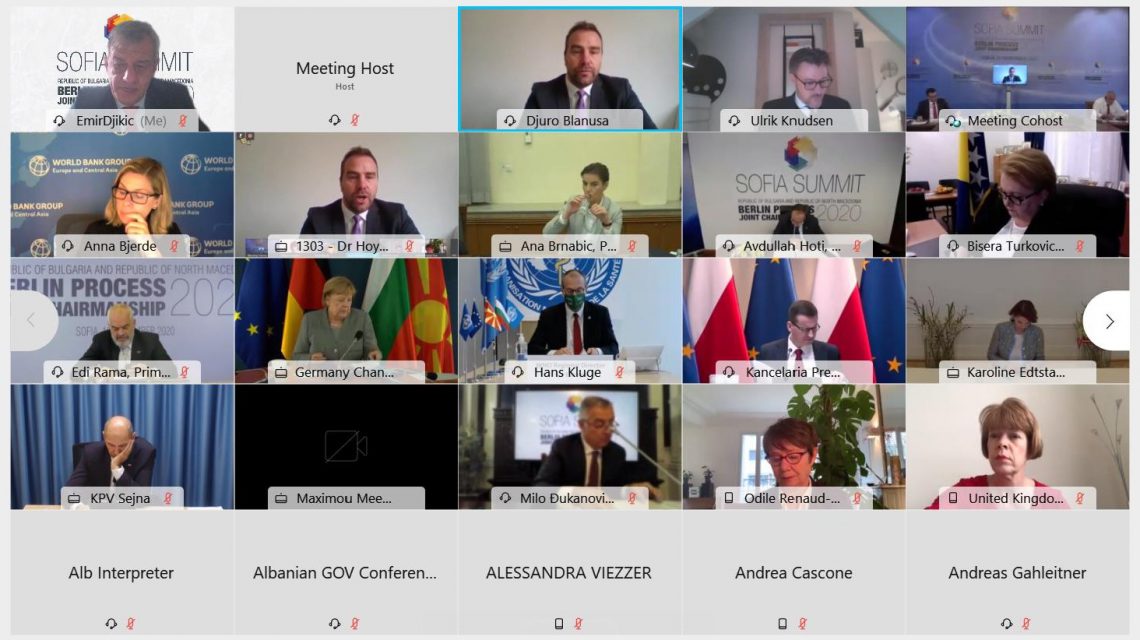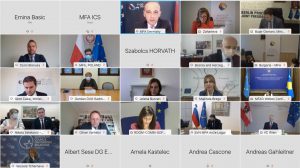SOFIA – The seventh summit of the Berlin Process took place in Sofia and online on 9-10 November 2020. It gathered stakeholders interested in regional connectivity and cooperation: governments, international and regional organizations as well as the civil society representatives. As one of the most concrete results of the Berlin Process, RYCO contributed to the summit advocating for more regional youth cooperation, mobility and exchange, but also promoting an enabling environment for such cooperation in the Western Balkans.
RYCO Secretary General Mr Đuro Blanuša participated in the meeting of the ministers of foreign affairs when he presented RYCO’s results and upcoming activities. He underlined the Western Balkans School Exchange Scheme, a multi-donor action, jointly co-financed by the European Union and the German Federal Ministry for Economic Cooperation and Development (BMZ) and implemented by Deutsche Gesellschaft für Internationale Zusammenarbeit (GIZ) GmbH in close cooperation with RYCO. This action has a planned duration of 36 months and is scheduled to kick off on 1 December 2020.
Mr Blanuša also thanked Germany’s Presidency of the Council of the European Union for putting the Western Balkan youth migration issue on its official agenda. He also presented the expectations and attitudes of young people outlined in the Background Paper of the “Young People, Migration and the Demographic Challenge in the Western Balkans” conference.
Finally, the RYCO Secretary General commended the progress made in developing regional infrastructure but underlined the need for further efforts in bringing the people of the region closer together to fostering people-to-people connectivity.
Mr Blanuša also participated in the plenary session “New Opportunities and Challenges for the Berlin Process: Common Regional Market and Green Agenda for the Western Balkans” that gathered the heads of delegations of the Berlin Process participants and representatives of the international and regional organizations where he underlined that the overall mobility across the region should be made easier, through public-private partnerships and much needed infrastructural projects that will make borders invisible. “The issues such as visas should become a matter of the past,” he underlined.
In the Chair’s Conclusions, the leaders reemphasized the critical role of young people for the prosperity of the whole region. While remaining concerned of the reinforced pace of brain drain and scarcity of opportunities for young people in the region, the leaders commended the decision of the Joint Chairmanship to treat youth-related issues and policies as a horizontal dimension of its priority agenda.
They also agreed that there is a growing need for a structured approach in tackling the brain drain issue and a necessity for greater engagement and involvement of young people in policymaking. Targeted policymaking is needed to reflect young people’s needs and interests, providing favourable grounds and incentives for keeping young minds and talents in the region, the document read.
Moreover, the leaders commended the work of RYCO and underscored that the organization is an important regional stakeholder promoting educational, cultural, and other positive relevant exchanges as well as reconciliation and good neighbourly relations. They reaffirmed their support for RYCO.
Finally, the leaders also welcomed the invitation by Chancellor Merkel for organizing the next summit in Berlin in 2021.





